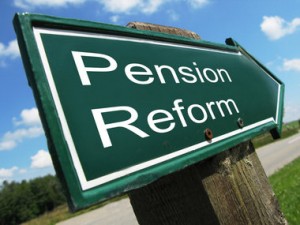The battle over California pension reform

Depending on how you measure it, California public pensions have an unfunded liability of anywhere from $240 billion to over $500 billion. Ignoring the problem and using accounting tricks will not make this go away. Under the existing framework, California owes far more to public workers than it can ever hope to pay. The system must be reformed.
On that front, California Pension Reform has halted its campaign saying the phrasing forced upon it by the Attorney General and the Legislative Analyst's Office was deliberately biased against it in favor of proposals by Gov. Brown. Veteran Sacramento Bee reporter Dan Walter agrees with this assessment saying "It's using political office to fix the game, and it undermines democracy."
Republicans backed Democratic Governor Jerry Brown’s 12 point pension plan while Democrats opposed it. Given that the state legislature is controlled by Democrats, the bill faces a difficult future. Democrats countered with a proposal that nongovernmental workers be guaranteed some type of pension plan. Any business with five or more employees would be required to enroll and would be given the opportunity for CalPERS to manage its funds. Since CalPERS has had myriad funding shortfalls and internal problems, I’m guessing many employers will not be embracing this plan.
The governor’s 12 point plan appears to be a good start but takes a gradual approach which probably won’t take effect quickly enough. Its main proposals are:
- Equal Sharing of Pension Costs: All Employees and Employers
- “Hybrid” Risk-Sharing Pension Plan: New Employees
- Increase Retirement Ages: New Employee
- Require Three-Year Final Compensation to Stop Spiking: New Employees
- Calculate Benefits Based on Regular, Recurring Pay to Stop Spiking: New Employees
- Limit Post-Retirement Employment: All Employees
- Felons Forfeit Pension Benefits: All Employees
- Prohibit Retroactive Pension Increases: All Employees
- Prohibit Pension Holidays: All Employees and Employers
- Prohibit Purchases of Service Credit: All Employees
- Increase Pension Board Independence and Expertise
- Reduce Retiree Health Care Costs: State Employees
Most of these proposals deal with new workers. Phasing in mild reform over a number of years may somewhat help the problem going forward but does little to remedy the existing unfunded liabilities. The primary problem with the current pension plan is that it defines what the benefits will be without providing adequate funding for them. The ‘hybrid’pension proposal attempts to deal with this but is rather vague, and understandably so. Much of the current system is mandated by law. For real change to occur, laws will need to be rewritten, something unions will strongly resist. Pension reform needs to happen in California, but it will not happen easily, and it will not be painless.



